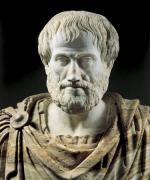|
This section contains 7,082 words (approx. 24 pages at 300 words per page) |

|
SOURCE: "Aristotle on Necessary Truth and Logical Priority," in American Philosophical Quarterly, Vol. 18, No. 4, October, 1981, pp. 285-93.
In the following essay, Ferejohn traces Aristotle's effort to provide an accurate account of a specific kind of necessary truth which pertains to the "'definitional' features "of sentences. Ferejohn argues that Aristotle's work in this field led him to the development of the doctrine of logical, or definitional, priority—a doctrine which Aristotle later applied as an analytical tool in other types of philosophical endeavors.
Aristotle was not the first to worry about necessary truth; the peculiarly Greek insistence that the objects of knowledge "cannot be otherwise" seems to have had as much a formative effect on the Platonic epistemology as it did on the theory of demonstrative science set out in the Analytics.1 Nor was Aristotle the first to see a close connection between necessary truth and such properties of...
|
This section contains 7,082 words (approx. 24 pages at 300 words per page) |

|


